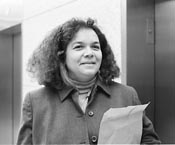|
Union Activism March-April 2003 The California State Bar Chapter is an example of unionism at its best. The union represents all workers across class lines from attorneys to receptionists.
Judicial executive secretary Dan Gaff assists the presiding judge of the State Bar Court doing everything from writing letters to preparing reports and redesigning procedural manuals. Working for the court gives him an interesting perspective on the judicial process. “Unlike other offices where attorneys advocate for one side or the other the court tries to be neutral. Our mission is to decide cases fairly and objectively.” Often he will be assigned to arrange conferences between the two sides. Much of his job is problem solving, and he sees the union as playing a major part. “I have been involved with the action committee, trying to get the membership invigorated and empowered to take pride in the union, and join together to send a message to management that we are a strong and unified bunch. It gives the membership an opportunity to see their coworkers actively engaged in fighting for their rights, and that is really important to them.”
Northern California Bar Chapter president Scott Williams is a billing technician. His department adjusts the State Bar members’ payments and reinstates members who have been suspended for non-payment of dues. He described how the employee-employer committee resolved a major problem in his department. In the past, suspension dates varied depending on the billing statement, then management decided to make things more uniform with one date for suspension, September 1 of every year. Unfortunately that was the week when kids get ready to start school after summer break. Four women who work in the billing department have school-age kids and they had always taken the week off to help get their kids ready for school. At first management refused to budge. “They said it was set in stone,” Williams recalls. “Well, we took it to the committee, and sure enough we got it changed to September 15. That meant a lot to those four parents and their families.” What is it like for a billing technician to be the president of an organization that represents attorneys? The solidarity has been wonderful, “The attorneys here are very helpful. If you ask them to find something out for you they find it out. It is really a pleasure to be president for people who will go to any length to get the message out and put a good face on the Bar,” he states with pride.
Law librarian Terrie Mesa is the secretary-treasurer of the chapter. “Being a librarian and being a steward are similar, people ask you for legal information and help,” she laughs. She gets a lot of satisfaction from being a steward, “The best feeling is when management handles a disciplinary situation better [in closer compliance with the contract] than they handled the last one. The members receive fairer treatment, and there is proof that what we do makes a difference.” Before working at the State Bar she worked for a public interest legal office. She enjoys empowering people with information, “I’ll look up for people the ADA [Americans with Disabilities Act] text, or help them understand the meaning of progressive discipline.” The majority of workers were laid off from the State Bar when then Governor Wilson punished the Bar for some of its political stands by vetoing the bill that set the fees the Bar collects from its members in 1998. Mesa was one of the first people hired in 1999 after newly-elected Governor Davis restored the fees. She remembers those first union meetings when everyone was still on probation. “They were reluctant at first to stand up but after they were off probation lots of people started speaking up. When our negotiations began, our union representative Bobbie Rabinowitz brought us t-shirts. There are 150 members in the bargaining unit and we gave away 135 t-shirts in less than two hours. People put them on their chairs or folded them into rectangles and pinned them up as posters. Then every Friday we wear them.”
Former Southern California Chapter president Barbara Field began working for the Bar in 1991. She was one of the workers who remained on the job through the layoffs. “The union has helped create a community. Even management has appreciated what we have accomplished,” she states. According to Field the union has helped professionalize and standardize employment practices at the Bar, including discipline procedures and pay equity. “Oftentimes managers are not the greatest communicators when it comes to performance problems and what changes the employee needs to make,” she explains. “They may not care if someone loses their job, whereas a steward helps to explain what they need to do to keep their job. It may be easier for a worker to hear it from us than from their manager. We have not only saved peoples’ jobs but made people happier working here. And management has also appreciated our assistance telling them how to address a problem, when they have been willing to hear it. Stewards have also resolved interpersonal conflicts between workers before they became management problems. “I think saving someone’s job is the best thing you can do next to a doctor saving someone’s life, and I have helped save people’s jobs. We have on the whole a pretty cooperative relationship with management.”
|
|||||||||||||||




